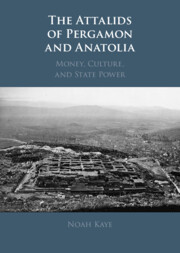The Attalids of Pergamon and Anatolia
Historians have long wondered at the improbable rise of the Attalids of Pergamon after 188 BCE. The Roman-brokered Settlement of Apameia offered a new map – a brittle framework for sovereignty in Anatolia and the eastern Aegean. What allowed the Attalids to make this map a reality and leave their indelible Pergamene imprint on our Classical imagination? In this uniquely comprehensive study of the political economy of the kingdom, Noah Kaye rethinks the impact of Attalid imperialism on the Greek polis and the multicultural character of the dynasty’s notorious propaganda. By synthesizing new findings in epigraphy, archaeology, and numismatics, he shows the kingdom for the first time from the inside. The Pergamene way of ruling was a distinctively noncoercive and efficient means of taxing and winning loyalty. Royal tax collectors collaborated with city and village officials on budgets and minting, while the kings utterly transformed the civic space of the gymnasium. This title is also available as Open Access on Cambridge Core.
Noah Kaye is Assistant Professor in the Department of History at Michigan State University. He is an ancient historian who has worked extensively throughout the eastern Mediterranean, in Greece, where he was the Heinrich Schliemann Fellow at the American School of Classical Studies at Athens; in Israel, where he was a Fulbright Postdoctoral Fellow at the University of Haifa; and in Turkey, where he was a Senior Fellow at the Koç University Research Center for Anatolian Civilizations. He has conducted and published archaeological fieldwork in Greece (Molyvoti Thrace Archaeological Project) and Turkey (Boğsak Archaeological Survey, Cilicia). He is also an epigrapher and a numismatist, and has contributed to the multilingual corpus of inscriptions Corpus Inscriptionum Iudaeae/Palestinae.



